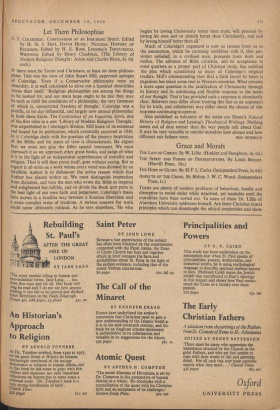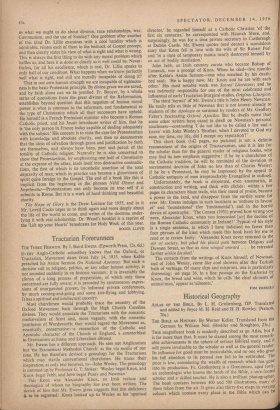Grace and Morals
THE HOPE OF GLORY. By H. F. L. Cocks. (Independent Press, ls. 6d.) THERE are plenty of modern problems of behaviour, hostile and disruptive to social order while unsolved, yet insoluble until the moralities have been sorted out. To some of these Dr. Lillie of Aberdeen University addresses himself. Are there Christian moral principles which can disentangle the ethical perplexities and show
us what we ought to do about divorce, race relationships, war, Communism, and the use of Sunday? One problem after another of this kind Dr. Lillie examines with a cool lucidity which is admirable, relates each of them to the bedrock of Gospel precept, and then clearly states his view of what is right and what is wrong. This is always the first thing to do with any moral problem which baffles us, and here it is done as clearly as it well could be. Never- theless, for all his excellence, which is real, Dr. Lillie speaks to only half of our condition. What happens when we know perfectly well what is right, and still are morally incapable of doing it?
That in our own human strength we are incapable of righteous- ness is the basic Protestant principle. By divine grace we are saved, and by faith alone can we be justified. Fr. Bouyer, by a whole series of quotations from the great divines of the Reformation, establishes beyond question that this negation of human moral power is what is common to the reformers, and fundamental to the type of Christianity which all their successors have upheld. He himself is a French Protestant minister who became a Roman Catholic priest, and his Jesuit introducer writes of him, that he is 'the only person in France today capable of dealing adequately with the subject.' His concern is to state the case for Protestantism with knowledge and absolute charity, and then to demonstrate that the ideas of salvation through grace and justification by faith are themselves, and always have been, part and parcel of the totality of Catholic religion. Naturally he is also concerned to show that Protestantism, by emphasising one half of Christianity at the expense of the other, leads itself into destructive contradic- tions, the first of which is its uncatholic assertion of the total depravity of man, which in practice can become a gloominess of spirit quite foreign to the Gospel. The end of a book like this is implicit from the beginning in the phrases Nihil Obstat and Imprimatur—Protestantism can only become its true self if it submits to Rome. But it is a work of hard thinking and beautiful charity.
The Hope of Glory is the Drew Lecture for 1955, and in it Mr. Lovell Cocks urges us to think again and more deeply about the life of the world to come, and writes of the doctrine under- lying it with real scholarship. Dr. Wand's booklet is a reprint of the 'Lift up your Hearts' broadcasts for Holy Week of this year.
ROGER LLOYD











































 Previous page
Previous page